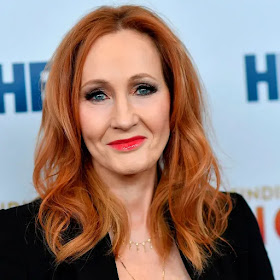I couldn’t believe it when J.K. Rowling killed off the greatest wizard, Albus Dumbledore, at the end of book six, Harry Potter and the Half-Blood Prince. Dumbledore was my favorite character in that series of books. He was not only the most skilled wizard, he was the perfect teacher for Harry Potter. Dumbledores was stern, a tough taskmaster, yet you knew that he had Harry’s best interests at heart and cared deeply for his pupil. Without Dumbledore’s abilities, how could the concluding book seven show Good triumphing over the forces of Evil, personified by Voldemort and his minions?
 |
| Michael Gambon as Dumbledore in the Harry Potter movies |
 |
| J.K. Rowling |
When you’re writing a plot, you have to keep in mind who your main characters are. They are the ones who have to untangle the issues that the narrative is following, even if you have to shove off the stage the most interesting, charismatic, powerful, or witty character. This is particularly true in literature for children and young adults, where the kids have to resolve the difficulties, and not the adults.
In any case, a larger-than-life character such as Albus Dumbledore is not necessarily the one readers identify with as strongly as the protagonist, and not necessarily the one readers root for most ardently. The hero/heroine, more like us, with our flaws and fears, is the one who has to face down the antagonist in the end, in order for the drama to work its magic.
Zack’s memoir about his father, the writer Lee Rogow: Hugging My Father’s Ghost
Zack’s most recent book of poems, Irreverent Litanies
Other posts of interest:
Getting the Most from Your Writing Workshop
How Not to Become a Literary Dropout
Putting Together a Book Manuscript
Does the Muse Have a Cell Phone?
Poetic Forms: Introduction, the Sonnet, the Sestina, the Ghazal, the Tanka, the Villanelle
No comments:
Post a Comment